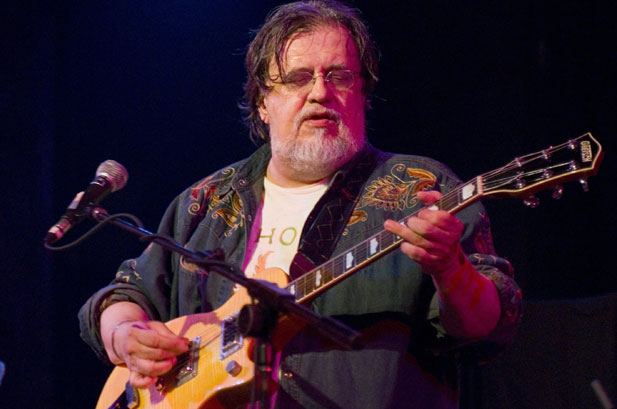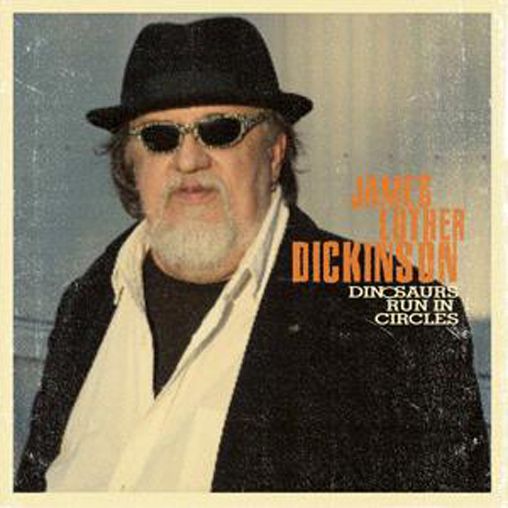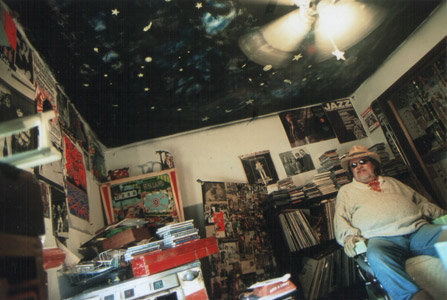CROSSING OVER
'I'm Not Dead, I'm Just Gone'
Jim Dickinson: A desire to capture the moment
James Luther 'Jim' Dickinson
November 15, 1941-August 15, 2009
The Memphis Commercial Appeal's Bob Mehr put it most succinctly when he opened his August 15 obituary of James Luther "Jim" Dickinson by noting: "The North Mississippi Allstars have lost their father, Bob Dylan has lost a 'brother,' rock and roll has lost one of its great cult heroes and Memphis has lost a musical icon with the death of Jim Dickinson."
That's the short version of a legendary life in music, ended too soon when the 67-year-old Dickinson died while recuperating from triple bypass surgery at Memphis's Methodist Extended Care Hospital. Though inextricably linked to Memphis, he made his home in nearby Coldwater, MS, on a spread he dubbed Zebra Ranch that was occupied by two trailers, one serving as his home, the other his recording studio. He is survived by his wife, Mary Lindsay Dickinson, and his sons, Luther and Cody, gifted musicians who have made a name for themselves as the North Mississippi All Stars (lately Luther has been performing with the Black Crowes as well).
Hardly a household name, Dickinson was beloved by musicians and producers, and by fans who took notice of his name showing up frequently on important records. He also cut several solo albums, one of which, 1972's Dixie Fried, released by Atlantic, is considered a roots rock classic. Dickinson himself summed it up Dixie Fried as the distillation of a musical vision he had been pursuing, or "world boogie," in his memorable phrase. A devotee of the straightforward approach to recording—set up and let the musicians play, preferably without rehearsing, and get it on tape—Dickinson honed his studio chops working for and with both Sam Phillips, at the Sun studio (he was the vocalist on the Jesters' 1966 garage rock gem, "Cadillac Man," considered the famed label's last stab at glory during Phillips's years) and Chips Moman at American Studios. There was much of Moman's no B.S. attitude in Dickinson and more than a little bit of Moman's bluster, too—it was all part of the mythmaking process that both men mastered. But, also like Moman, behind it was a resume of substantial musical achievement.
Jim Dickinson performs 'Buffalo Skinner,' May 10, 2009, at Otherlands, in MemphisIn Dickinson's case, acclaim arrived not by way of his solo work but through his session work and producing saavy. Of the former, by far the most notable among his many contributions to others' recordings were his piano work on the Rolling Stones' "Wild Horses," recorded in Muscle Shoals, AL, with Dickinson's presence on the track made possible when the band's regular pianist, Ian McLagen, abruptly left the studio before the song was cut, saying he didn't know how to play minor chords. The story goes that during playback Mick Jagger asked Keith Richards what he thought of Dickinson's piano, and Richards said it was the only thing about the track that he liked. In 1977 Dickinson played on Bob Dylan's Time Out Of Mind album, and was referred to as a "brother" by Dylan in his Grammy Award acceptance speech. During his early years as a session player in Memphis, he formed the band The Dixie Flyers, which became the house band for Atlantic Records, then making its move into the southern market, and backed, among others, Aretha Franklin, Petula Clark, Screamin' Jay Hawkins, Arlo Guthrie, the Flamin' Groovies and Little Richard.
As easily as he had fit in with the Queen of Soul and the poet laureate of folk protest so did Dickinson find himself equally at home working with punk and independent artists in the '70s, starting with his production of Big Star's Third/Sister Lovers, an underground classic that was an aural document of a band disintegrating and was not officially released until 1992, by which time it had achieved a cult following by way of numerous bootlegs. He worked with Big Star frontman Alex Chilton again in 1979, on Like Flies on Sherbert, a disaster almost on the scale of the Big Star album that had the effect of making Dickinson a sought-after producer by a new generation of upstart rock bands surfacing at the time—Jason & the Scorchers, Green on Red, and others; most siginificantly, the Replacements sought out Dickinson and he helmed their masterpiece, Pleased to Meet Me (which included their song "Alex Chilton"). Arguably, his most enduring musical landmark as a producer came on Ry Cooder's 1972 Into the Purple Valley, as brilliant sonically as it was expertly played and evocatively written, an album in which even long-time listeners still find hidden surprises.
Dickinson's final solo album, Dinosaurs Run in Circles, was released this past May. Comprised of pop and jazz-influenced standards he recalled from his youth, Dickinson recorded some of the tracks based on arrangements from his mother's original sheet music.Dickinson was born in Little Rock, AK, on November 15, 1941, and briefly lived in Chicago before his family settled in Memphis. At White Station High School he formed his first band, The Regents, did a stint with the Jesters, attended college in Texas but returned to Memphis before graduating and began his career as a session player. His Dixie Fried solo album debut immediately preceded his forming Mud Boy & the Neutrons, a band still revered in Memphis and surrounding environs for its no-BS attitude and devotion to unfettered rock 'n' roll. Noting his straddling of all the modern eras of Memphis music history, the Commercial Appeal's Mehr said Dickinson's impact on the city's music over the past four decades "is significant; perhaps more than anyone, he was uniquely connected to the city's historic past and its present."
A week prior to his death, Dickinson had been celebrated with a tribute concert at The Peabody Skyway in Memphis, an event designed to help defray his medical costs. John Hiatt headlined and was joined by an all-star group of Memphis musicians.
"He went peacefully," his wife told Mehr, adding that her husband remained in good spirits until the end. "He had a great life. He loved his family and music. And he loved Memphis music, specifically." Luther Dickinson told the reporter the tribute concert would stand as the only public memorial to his father. "That was the best sendoff he could ever have wanted," Luther said.
Dickinson's self-chosen epitaph says it all about his understanding of his philosophy, "Life is fleeting. Art is long." It reads: I'm just dead, I'm not gone.
***
Joe Hardy Remembers Jim Dickinson
Joe Hardy, a Kentucky native who wound up making music in Memphis in the early '70s, then engineering at Stax shortly before it went bankrupt and ultimately becoming a sought-after producer and engineer while in residence at the city's famed Ardent Studios, had both a personal and professional friendship with Jim Dickinson. To the online Lefsetz Letter he wrote the following reminiscence, published on August 18.
I first met Jim Dickinson in 1971. Subsequently, I co-produced with him (he loved being able to put "a Hard/Dick Production" on the sleeve), engineered countless records for him, walked out on more than one session, and, even though we never agreed on how records should be made, reluctantly learned some things from him.
You have to know Memphis to understand Jim. Even then, he's something of a cipher. He had an encyclopedic knowledge of the Delta's history (matched only by Billy Gibbons, though I wouldn't place a bet either way), which he's passed on to his sons, Luther and Cody. For all of his bullshit—and he was a self-proclaimed master—he was an exceptional father and husband.
He'd sometimes use musicians who could barely play to induce a sense of "psychodrama." More than once, he bounced golfballs off piano strings or used a meat tenderizer hammer on a hihat. He was able to handle the Replacements, for godssakes.
He was virulently anti-technical but, at the same time, embraced new technologies wholeheartedly. No '"foolish inconsistency" or hobgoblins about him.
He once "appropriated" some masters because the powers-that-were insisted on taking a project we were working on in a direction we both considered unaesthetic. He only released them when a functionary brought a briefcase full of cash to a Mexican restaurant in Encino. And Jim kept the briefcase.
He could have had a more mainstream career but he became physically ill anytime he entered Los Angeles County. Instead, he chose projects he loved. If they had money, that was great. If they didn't, even better.
The most enduring lesson he taught me (though avoiding Los Angeles like a pox-ridden whore was a close second) was never trust a major label and you'll be right 99 percent of the time. This was 30 years ago, before their villainy and incompetence were common knowledge.
Jim was a "character," one shaped by the space/time vortex that is Memphis, by a fierce and unbending passion for art and contempt for the corporate mentality that is its antithesis. He'll be missed, even, in some indefinable way, by those who never knew him.
Best,
Joe Hardy
Houston***
Jim Dickinson's Production Manifesto
(as posted on his websiste, www.zebraranch.com)
'The essence of the event is its soul'The unretainable nature of the present creates in Man a desire to capture the moment. Our fears of extinction compel us to record—to re-create—the ritual ceremony. From the first hand-print cave painting to the most modern computer art, it is the human condition to seek immortality. Life is fleeting. Art is long. A record is a "totem," a document of an unique, unrepeatable event worthy of preservation and able to sustain historic life. The essence of the event is its soul. Record production is a subtle, covert activity. The producer is an invisible man. His role remains a mystery. During the recording process there is an energy field present in the studio—to manipulate and to maximize that presence—to focus on the peculiar "harmony of the moment" is the job of the producer. Music has a spirit beyond the notes and rhythm. To foster that spirit and to cause it to flourish—to capture it at its peak is the producer's task. — Jim Dickinson
Jim Dickinson discusses a producer's credo: 'Hits are in baseball'
THE BLUEGRASS SPECIAL
Founder/Publisher/Editor: David McGee
Contributing Editors: Billy Altman, Laura Fissinger, Christopher Hill, Derk Richardson
Logo Design: John Mendelsohn (www.johnmendelsohn.com)
Website Design: Kieran McGee (www.kieranmcgee.com)
Staff Photographers: Audrey Harrod (Louisville, KY; www.flickr.com/audreyharrod), Alicia Zappier (New York)
E-mail: thebluegrassspecial@gmail.com
Mailing Address: David McGee, 201 W. 85 St.—5B, New York, NY 10024
Founder/Publisher/Editor: David McGee
Contributing Editors: Billy Altman, Laura Fissinger, Christopher Hill, Derk Richardson
Logo Design: John Mendelsohn (www.johnmendelsohn.com)
Website Design: Kieran McGee (www.kieranmcgee.com)
Staff Photographers: Audrey Harrod (Louisville, KY; www.flickr.com/audreyharrod), Alicia Zappier (New York)
E-mail: thebluegrassspecial@gmail.com
Mailing Address: David McGee, 201 W. 85 St.—5B, New York, NY 10024




